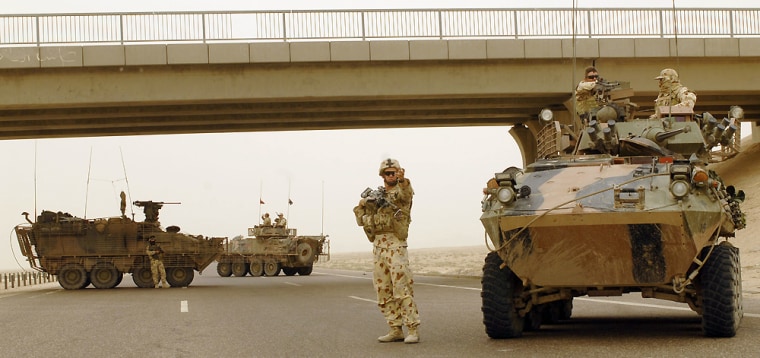Australia ended its combat operations in southern Iraq on Sunday, while the Iraqi government said it has differences with the United States in negotiations over a long-term security agreement.
The official statement by government spokesman Ali al-Dabbagh comes amid growing opposition to the deal among Iraqis who see it as a possible violation of Iraq's sovereignty and are worried about an extended presence of American troops.
Talks "are still in their early stages and the Iraqi side has a vision and a draft that is different" from those being presented by U.S. negotiators, al-Dabbagh said.
He was not more specific about the points but insisted the Iraqi government was focused on "fully preserving the sovereignty of Iraq ... and will not accept any article that infringes on this sovereignty and doesn't guarantee the interests of Iraqis."
The spokesman also said it was too early to discuss dates for an agreement and said each stage of negotiations would be presented to the Iraqi national security council.
His comments came two days after tens of thousands of followers of anti-U.S. cleric Muqtada al-Sadr took to the streets to protest the deal. Al-Sadr and his loyalists have called for the issue to be put to a public referendum.
U.S. not seeking permanent bases
U.S. officials insist they are not seeking permanent bases but have not otherwise commented on the negotiations, which the two sides hope to complete by July. The agreement is to replace a U.N. mandate for U.S.-led forces that expires at the end of the year.
Foreign Minister Hoshyar Zebari said negotiators have made "a great deal of progress" and the government has sent teams to Germany, Turkey, South Korea and Japan to see how they handled the presence of foreign troops.
However, he stressed the situation in Iraq was different because the violence has not ended.
"Our forces and capabilities haven't reached the level of self-sufficiency," Zebari said at a joint news conference with visiting French Foreign Minister Bernard Kouchner. "We need this strategic security agreement ... for the time being. But this is not open-ended."
The U.S. military, meanwhile, faced a dwindling coalition of allied countries providing supporting combat troops in Iraq.
Troops held a ceremony Sunday that included lowering the Australian flag from its position and raising the American flag instead over Camp Terendak in the southern Iraq city of Nasiriyah.
"We have to praise the role of the Australian troops in stabilizing the security situation in the province through their checkpoints on the outskirts of the city," said Aziz Kadim Alway, the governor of the Dhi Qar province.
The Iraqi government already has assumed security responsibilities for the Shiite-dominated province, which includes the volatile city of Nasiriyah. But the Australians remained there to help if necessary while also training Iraqi security forces and doing reconstruction and aid work.
The U.S. military said American troops would temporarily take over those responsibilities.
Australian Prime Minister Kevin Rudd was swept into office in November largely on the promise that he would bring home the country's 550 combat troops by the middle of 2008, saying the Iraq deployment has made Australia more of a target for terrorism.
Decision won't harm bilateral relations
U.S. President George W. Bush said in March that he understood the decision and it would not harm bilateral relations.
The Australians had "successfully accomplished their mission" and their contributions "assisted in the stabilization and development of Iraq," U.S. military spokesman Col. Bill Buckner said in a statement.
The combat troops were expected to return home over the next few weeks.
But the Australians said several hundred other troops will remain in Iraq to act as security and headquarters liaisons and to guard diplomats. Australia also will leave behind two maritime surveillance aircraft and a warship to help patrol oil platforms in the Gulf.
Also on Sunday, a U.S. soldier was killed by an armor-piercing roadside bomb in northeastern Baghdad, the military said. No further details were released.
A car bomb exploded Sunday in a parking lot across the street from the Iranian Embassy, killing at least two civilians and wounding five people, including three embassy guards.
Elsewhere in the capital, a senior police official was wounded and a traffic cop was killed when a bomb stuck to the official's car exploded in a busy intersection.
Two civilians also were killed in separate roadside bombs in the area of Baqouba, northeast of Baghdad.
The violence was reported by officials who spoke on condition of anonymity because they weren't authorized to release the information.
In another development, a U.S. helicopter crashed Sunday south of Baghdad, wounding the two American soldiers who were aboard, the military said. The military said the crash was being investigated but appeared to be due to mechanical failure.
